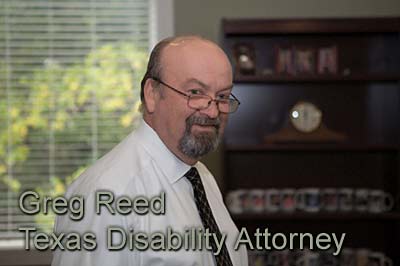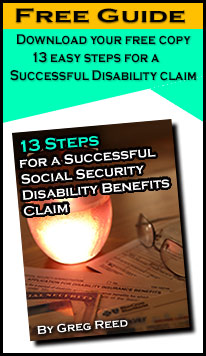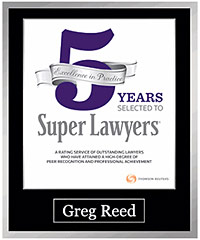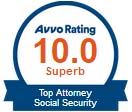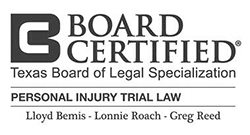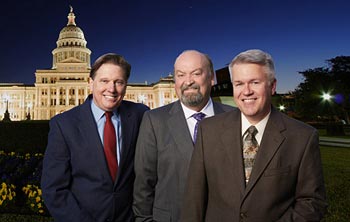What Will Happen at My SS Disability Appeal Hearing?
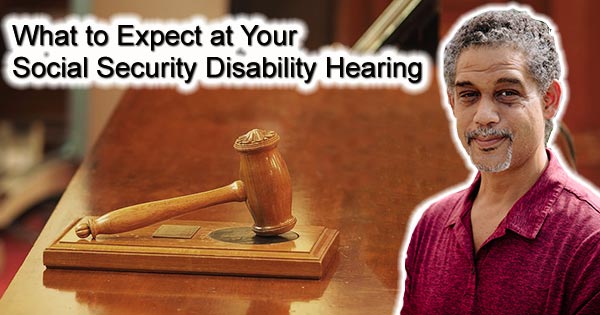
Most initial claims for Social Security Disability Income are denied but that does not mean your claim will not be approved. 49% of cases are approved at the hearing stage. Having an experienced disability attorney at your side to guide you through the hearing can make the crucial difference between a successful and unsuccessful outcome.
Most initial claims for Social Security Disability Income are denied and only 13% of claims are approved on reconsideration, but that does not mean your claim will not be approved. Forty-nine percent (49%) of cases are approved at the hearing stage, the third step in the SSDI appeal process where an applicant has the opportunity to present their case before an administrative law judge, or ALJ. Administrative law judges who work for the Social Security Administration make decisions on Social Security disability claims at the hearings level. It is the ALJ’s job to issue an independent decision and not be influenced by the fact that an applicant was previously denied. Though you may certainly represent yourself, having an experienced disability attorney at your side to guide you through the hearing can make the crucial difference between a successful and unsuccessful outcome.
You or your attorney may request a hearing online at Social Security’s website or by sending a letter to Social Security.
All hearing requests must be in writing and be submitted within 60 days of receiving a denial notice. When Social Security receives your request, they will forward your case file to the administrative law judge’s Hearing Office. When your hearing is scheduled, Social Security will send you a notice 75 days before the hearing stating the location, date, and time of the hearing.
When a hearing can be scheduled will depend on the number of cases to be heard and the ALJ’s schedule.
Hearings may be scheduled in person or via telephone or online video conferencing. Telephone or online video hearings are not obligatory. A hearing office staff member will contact you or your attorney in advance of the hearing and you may agree to a telephone or online video hearing or request that Social Security postpone the hearing. If you choose to postpone the hearing, be aware that Social Security will not have an estimate of when they will be able to hold the hearing. If you decline an online or telephone hearing, but later change your mind, you may contact the hearing office and request to have your hearing rescheduled.
If you have been denied disability don’t give up! Contact a Disability lawyer at 512-454-4000 for a free consultation and get the benefits you deserve.
In-person hearings are usually held within 75 miles of the applicant’s home at a Hearing Office, a bank, or a hotel.
If travel is a problem, you must tell Social Security at the time you request a hearing, and if health problems create an issue, you should submit a doctor’s report with your request explaining why you can’t travel.
Claimants and their attorneys can attend an online video hearing from any private place with a secure internet connection using a camera enabled phone, tablet, or computer.
Social Security conducts online video hearings the same way it conducts telephone and in-person hearings. You will be able to see the ALJ and your attorney. Other participants such as vocational and medical experts and interpreters will join by phone only. You may also bring any witnesses to the hearing who can substantiate your case. The ALJ will swear in all participants, listen to testimony, and ask you questions, if necessary. You and your attorney will also have the opportunity to ask questions.
Hearings are usually short, about 15 minutes to one hour.
First impressions are important. You should dress neatly and conservatively and be on time; if you are late, an ALJ may not have enough time to hear your case. Any evidence supporting your case should have been submitted before the hearing, but if you do have supplemental evidence, for example, records of treatment received a day or two before the hearing, you may bring that information and ask to present it.
The ALJ will explain the issues in your case and may ask you questions about your past work and limitations. Some of the questions the judge may ask include:
- How long have you suffered from your condition?
- What are your symptoms?
- How long can you stand before you must sit down?
- How long are you able to sit before you need to move?
- How far are you able to walk?
- Are you able to bend over, kneel or squat?
- How has your condition affected your ability to do your job?
Appearing before an ALJ can be intimidating, but although you may feel embarrassed to answer some of these questions, it’s important to be honest and as specific as possible.
Be confident, but avoid being confrontational when speaking. Address the judge as “Your Honor.” These hearings are your opportunity to give the judge a detailed understanding of your physical and mental limitations and how they impact your work and personal life. The ALJ needs to know how well you can or cannot function and will use this information to decide whether you should or should not receive disability benefits. The judge will also review your medical records to decide if you are eligible for SSDI. Medical records provide evidence that your physical or mental condition is so severe you cannot work. You and your attorney should review your case file and submit any evidence that you want the judge to consider well before the hearing. If you do not have some information at the time you request a hearing, you should submit it no later than five days before the hearing.
The ALJ will also question vocational and medical experts at the hearing.
A vocational expert testifies about the range of available jobs for various occupations and whether an individual with certain impairments is capable of performing a particular job. Vocational experts are present at approximately 85% of disability hearings and their testimony is critical to the success of an applicant’s claim. Typically, the ALJ will ask the vocational expert (VE) if someone with your impairments could still do your job. If the VE believes you are still able to do your past job, your claim will be denied. If the VE thinks you are no longer able to perform your past work, the ALJ will ask the VE more hypothetical questions to see if you can do any other jobs. If the VE believes there are jobs a person with your impairment could perform, the VE would then state the job titles, job codes and the number of available jobs in the area near where you live. If the VE believes there are jobs which you could perform in your location, then your claim will be denied.
After the ALJ has discussed your claim with the Vocational Expert, your attorney will be allowed to ask the VE questions.
If the VE has concluded that your disability does not prevent you from working, your attorney will challenge the VE. Your attorney’s goal is to get the VE to state that there are no jobs available in your area that you can do. This cross-examination is the most important part of the hearing. If the VE’s opinion on what jobs you can do is not disputed, you will lose your appeal.
After your hearing, your case file will be held at the Office of Hearing Operations (OHO) until the judge makes their decision.
This may take anywhere from two weeks to three months or longer. If your claim is denied, your file will remain at OHO and you will receive a notice of denial with information on how to appeal the decision. If your claim is approved, Social Security will check to see if you are making Substantial Gainful Activity (SGA), which in 2024 is $1,550 for non-blind individuals and $2,590 for blind individuals. If you meet Social Security’s financial requirements, Social Security will send you a Notice of Award stating the amount of benefit you will receive and whether the judge issued a “fully favorable” or “partially favorable” decision. The difference between “fully favorable” and “partially favorable” is whether the judge agrees that the date of onset of your disability is correct; this can impact the amount of backpay you receive. For example, if the judge believes your disability began one month after the onset date stated in your file, you would receive less backpay. Your file will then be sent to Social Security’s payment processing and you should receive payment within one month – assuming that your onset date occurred more than five months before the judge approved your claim.
There are many reasons why you should hire an experienced disability attorney to represent you in your disability claim, especially at the appeal level.
First, administrative law judges approve a greater percentage of claims in which an applicant has legal representation. A disability lawyer can prepare a stronger case by gathering medical records and doctors’ opinions, preparing you for questioning and skillfully cross-examining a vocational or medical expert to your best advantage. Also, an attorney who has previously presented cases before an ALJ will know how to manage any weaknesses in your case as well as build up its strengths given that knowledge.
The appeals process can be very complicated, and trying to prepare for a disability hearing alone is very challenging.
Fortunately, you do not have to figure everything out yourself. The skilled disability lawyers at Bemis, Roach & Reed help Texans just like you appeal denied disability applications. We understand how disability hearings work and will thoroughly prepare you for your day in court. If you live in Texas contact us today for a free initial consultation.
Disability benefits are an important source of income for those who are unable to work. If you are not able to work due to accident or illness, you may be eligible for Social Security Disability or Long Term Disability benefits. If you have applied for benefits and been denied, contact the attorneys at Bemis, Roach and Reed for a free consultation. Call 512-454-4000 and get help NOW.
Author: Attorney Greg Reed has been practicing law for 29 years. He is Superlawyers rated by Thomson Reuters and is Top AV Preeminent® and Client Champion Gold rated by Martindale Hubbell. Through his extensive litigation Mr. Reed obtained board certification from the Texas Board of Legal Specialization. Greg is admitted to practice in the United States District Court - all Texas Districts and the United States Court of Appeals-Fifth Circuit. Mr. Reed is a member of the Travis County Bar Association, Texas Trial Lawyers Association, past Director of the Capital Area Trial Lawyers Association, and an Associate member of the American Board of Trial Advocates. Mr. Reed and all the members of Bemis, Roach & Reed have been active participants in the Travis County Lawyer referral service.
Try these links for further reading on this subject:
What Information will I need to apply for SSDI?
How much does a Social Security Disability Attorney charge?
Denied Social Security Disability? The Video Appeal Hearing
Your Free Initial Consultation
At Bemis, Roach and Reed, if we can't help you, we will try to find the right attorneys for you.
We offer each of our prospective clients a free no obligation one hour phone or office consultation to see if we can help you and if you are comfortable with us. We know how difficult a time like this can be and how hard the decisions are. If we can be of assistance to you and help you find a solution to your issue we will even if that means referring you to another attorney.
Or simply call
512-454-4000
to schedule your
Free Consultation
Let's get you Started:
If you could provide us with some basic information about your claim we will get right back with you with a free case evaluation and schedule your Free Consultation Today.

